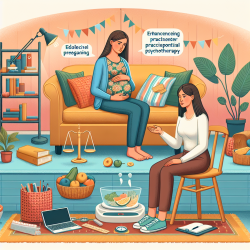As a practitioner working with adolescents, understanding the unique challenges faced by pregnant teens is crucial. The research article titled "Protocol for a pilot randomized controlled feasibility study of brief interpersonal psychotherapy for addressing social-emotional needs and preventing excess gestational weight gain in adolescents" offers valuable insights into how interpersonal psychotherapy (IPT) can be an effective tool in addressing these challenges.
The Importance of Addressing Social-Emotional Needs
Excess gestational weight gain (GWG) among pregnant adolescents is not just a physical health issue; it is deeply intertwined with social and emotional factors. Adolescents often face heightened levels of stress, depression, and interpersonal conflict during pregnancy, which can exacerbate GWG through mechanisms like overeating and reduced physical activity. Traditional lifestyle interventions focusing solely on diet and exercise have shown limited effectiveness, highlighting the need for a more comprehensive approach.
Interpersonal Psychotherapy: A Promising Approach
The pilot study explored the feasibility of implementing a brief IPT program specifically tailored for pregnant adolescents. This program aims to improve social functioning, reduce perceived stress and depression symptoms, and ultimately prevent excess GWG. The IPT sessions focus on relationship psychoeducation, emotion identification and expression, and communication skill-building. These sessions are designed to empower adolescents by enhancing their social support networks and reducing interpersonal conflicts.
Key Components of the IPT Program
- Psychoeducation: Educating adolescents about the link between social relationships, mood, eating behaviors, and healthy weight gain.
- Communication Skills: Teaching new communication strategies to reduce conflict and increase support within existing relationships.
- Emotion Regulation: Helping adolescents identify and express emotions effectively to mitigate negative emotional responses that contribute to unhealthy behaviors.
Implications for Practitioners
For practitioners, integrating these findings into practice can significantly enhance therapeutic outcomes for pregnant adolescents. By adopting an interpersonal approach that addresses the root causes of social-emotional distress, practitioners can help break the cycle of negative health outcomes associated with excess GWG.
Encouragement for Further Research
This pilot study serves as a foundation for further research into the effectiveness of IPT in diverse adolescent populations. Practitioners are encouraged to explore additional studies and consider how these findings can be adapted to meet the specific needs of their clients.
To read the original research paper, please follow this link: Protocol for a pilot randomized controlled feasibility study of brief interpersonal psychotherapy for addressing social-emotional needs and preventing excess gestational weight gain in adolescents.










